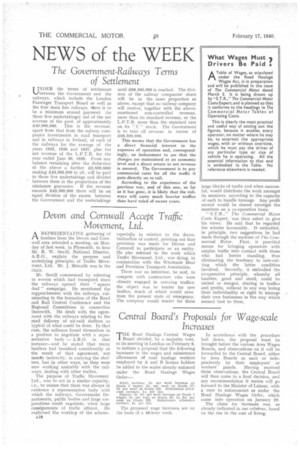Devon and Cornwall Accept Traffic
Page 20

If you've noticed an error in this article please click here to report it so we can fix it.
Movement, Ltd.
AREPRESENTATIVE gathering of hauliers from the Devon and Corn. wan area attended a meeting, on Monday of last week, in Plymouth, to hear Mr. R. W. Sewill, National Director, A.R.O., explain the purpose and underlying principles of Traffic Movement, Ltd. Mr. J. Metcalfe was in the chair, Mr. Severn commenced by referring to events which had transpired since the railways opened their "square deal" campaign. He mentioned the rapprochement with the railways, culminating in the formation of the Road and Rail Central Conference and the Regional Committees in connection therewith. He dealt with the agreement with the railways relating to the road delivery of air-raid shelters as typical of what could be done, In that case, the railways found themselves in a position to negotiate with a representative body — A.R.O. in that instance—and he stated that many hauliers had benefited considerably as the result of that agreement, not merely indirectly, in carrying the shel ters, but in other ways, as they were now working amicably with the railways, dealing with other traffics.
The purpose of Traffic Movement Ltd., was to act in a similar capacity, i.e„ to ensure that there N'as always in existence a representative body with which the railways, Government Departments, public bodies and large corporations could negotiate, when large consignments of traffic offered. He explained the working of the scheme,
Alf4 especially in relation to the decentra1i2aiion of control, pointing out that provision was made for Devon and Cornwall to participate as an entity. He also referred to the work which Traffic Movement, Ltd., was doing, in conjunction with the Wholesale Meat and Provision Transport Association.
There was no intention, he said, to compete with contractors who were already engaged in carrying traffics; the object was to tender for new traffics, much of which would arise from the present state of emergency. The company would tender for these large blocks of traffic and when success ful, would distribute the work amongst its members, according to the capacity of each to handle tonnage. Any profit earned would be shared amongst the members on a co-operative basis.
" S.T.R.," The Commercial Motor Costs Expert, was then asked to give his views. He said that he regarded the scheme favourably. It embodied, in principle, two suggestions he had made through the medium of The Commercial Motor. First, it provided means for bringing operators with surplus traffic into contact with those who had lorries standing, thus eliminating the tendency to rate-cutting which the latter condition involved. Secondly, it embodied the co-operative principle, whereby all hauliers, great and small, could be united or merged, sharing in traffics and profits, without in any way losing their individuality or right to manage their own businesses in the way which seemed best to them.




























































